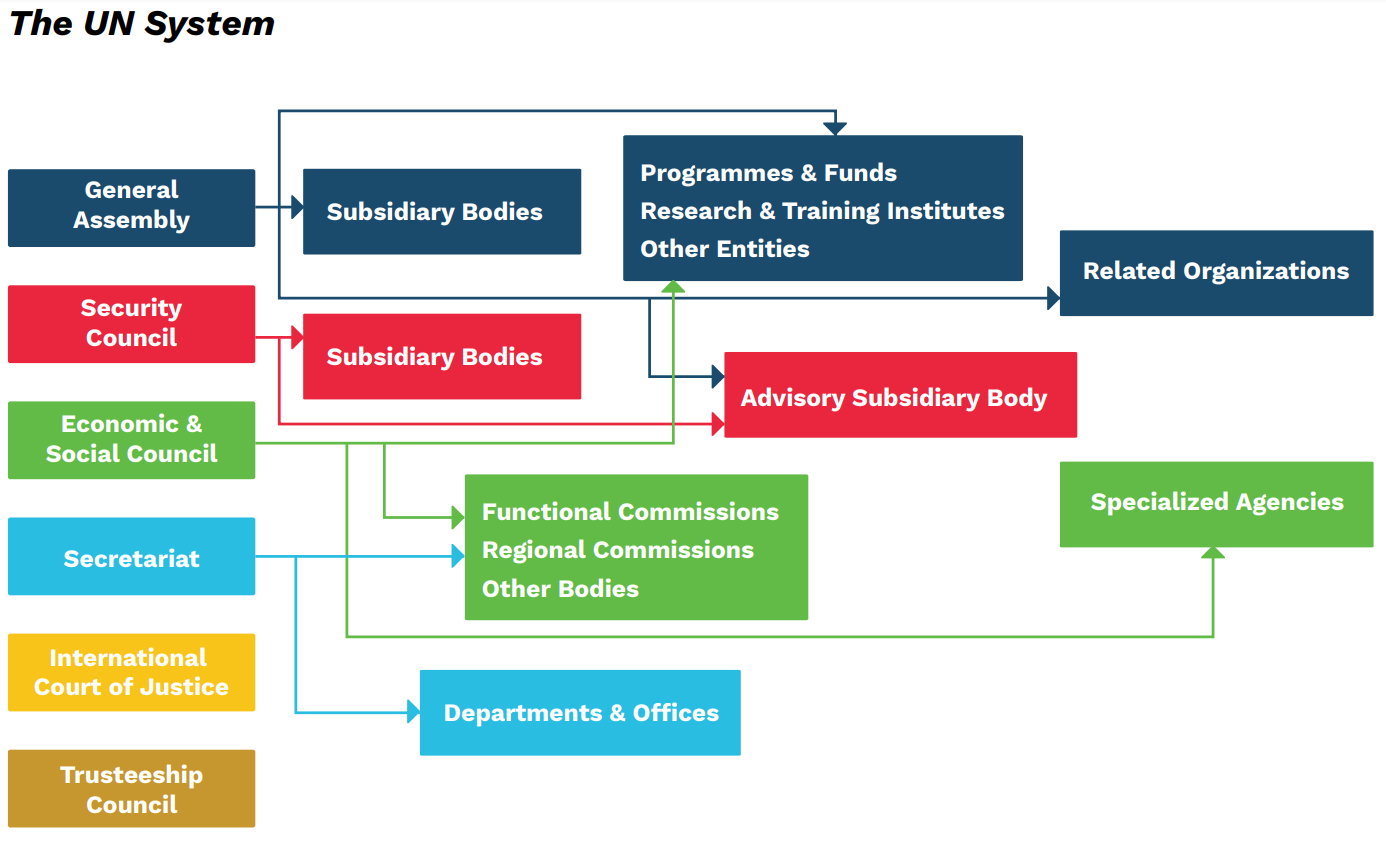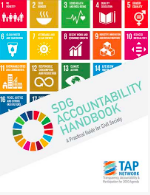The primary political mandate for oversight, follow up and review of the SDGs rests with the UN High-Level Political Forum on Sustainable Development (HLPF) held annually in New York under the auspices of the UN Economic and Social Council (ECOSOC). Additionally, the HLPF meets under the auspices of the UN General Assembly (UNGA) every four years, where world leaders, sustainable development experts and civil society will convene to assess progress towards the SDGs at the highest level, and provide political direction and guidance for SDG implementation in the years ahead. The two-week annual conference is mandated to provide political leadership, guidance and recommendations for the implementation of the 2030 Agenda by: tracking progress; encouraging the development of coherent policies informed by evidence, science and country experiences; addressing new and emerging issues; and providing a platform for partnerships.1
With the focus around implementation and follow-up and monitoring of the SDGs firmly placed on national governments, the HLPF represents a critical opportunity for countries to collectively discuss progress towards the SDGs and 2030 Agenda. This is particularly important to examine key challenges and emerging issues and to explore partnerships between governments, civil society and the private sector to accelerate progress towards achieving the SDGs.2 Each year, the HLPF reviews global progress on five or six SDGs, in addition to the cross-cutting SDG 17 on means of implementation.3 Since the inaugural HLPF, there have been concerted efforts to review SDG 16 on an annual basis given its centrality to the realization of the rest of the Ag
The meetings of the HLPF are intended to be open to the participation of civil society and a wide range of other stakeholders, making it a prime target for engagement of civil society at the global level. With the HLPF serving as the main forum for countries to present their Voluntary National Reviews (VNR) (see box below), it is particularly important for civil society organizations that are interested in SDG accountability to keep track of these discussions on a yearly basis. Even for CSOs not able to attend the HLPF in person, meetings will be available via webcast on official UN channels, particularly during the COVID-19 pandemic, and outputs and national progress reports will be posted on the UN Sustainable Development Knowledge Platform.4

What is the Voluntary National Review (VNR) process?
The HLPF provides an important global stage to showcase the work developed at the national level, to exchange experiences and good practices between countries (including on VNR preparations), and to measure overall progress toward the SDGs . As the main mechanism for tracking progress on the SDGs at the national level and reporting on it at the global level, the VNRs are a key moment for countries to be answerable to their citizens. The VNR process can strengthen national ownership of the SDGs, promote transparency, inclusiveness and participation in reporting on the SDGs, and support more effective implementation of the 2030 Agenda.5 An effective VNR process requires inclusive avenues of engagement from the subnational/national to global level and during all phases of the process: the initial preparation and organization; preparation of the VNR report; presentation at the HLPF; and follow-up after the HLPF. While some governments involve civil society in the VNR process, other countries exclude civil society from official processes—making CSO engagement at HLPF even more relevant and necessary in these contexts.
Currently, the Forum’s provisions for accountability of national governments are considered relatively weak: national reporting is voluntary, the interactive discussion on each VNR is very brief and has not met the substantive standards of other accountability processes in the UN system, and space for civil society participation in many aspects of the Forum is limited and not considered adequate for ensuring meaningful contributions. In addition, the technical preparations for the Forum are not linked to its high-level discussions in a way that ensures their findings and inputs are addressed.
While progress on inclusion and participation at the global level remains slow, there are efforts and initiatives to advance SDG16+ to ensure meaningful participation of civil society at the global level. Civil society can engage in various ways in the Forum:6
As part of its role as the global hub for review of the SDGs, the HLPF also serves to gather the results of the range of national, regional, international and thematic processes, mechanisms and institutions that have the potential to contribute to the follow-up and review. Thus, civil society actors can influence the Forum’s discussions and, by extension, the accountability of their own government, by contributing to processes that feed into the HLPF, such as:7
CSOs can also utilize the HLPF for forming partnerships and alliances with the thousands of civil society representatives and other actors gathered at HLPF meetings, to strengthen advocacy and accountability at home. Civil society participation in meetings of the HLPF is facilitated by the Outreach and Partnerships Branch in the Division for Sustainable Development Goals, which is part of the UN Department of Economic and Social Affairs (UN DESA).
SDG Accountability Handbook: A Practical Guide for Civil Society (TAP Network, 2018)
This handbook provides guidance on the different approaches and steps that can be taken by civil society to ensure accountability for the SDGs at every level.
Available at: https://sdgaccountability.org/

This annual report provides a global overview of the current situation of the SDGs, based on the latest available data for indicators in the global indicator framework.
Available at: https://sustainabledevelopment.un.org/content/documents/26158Final_SG_SDG_Progress_Report_14052020.pdf
The Exchange provides a forum for national governments and civil society to share experience and expertise in the design and implementation of partnerships that will contribute to achieving the SDGs.
Available at: https://sustainabledevelopment.un.org/hlpf/PartnershipExchange
This online platform contains the multi-stakeholder partnerships and voluntary commitments being profiled at the HLPF Partnership Exchange. CSOs can sign up for access to the database and use it to submit progress reports to the HLPF.
Available at: https://sustainabledevelopment.un.org/partnerships/
This initiative facilitates greater information-sharing for reporting on the SDGs between international, regional and local communities.
Available at: https://www.sdgreporting.org/
Major groups and stakeholders interested in engaging in the HLPF can register for the self-organized coordination mechanism and mailing list via
https://sustainabledevelopment.un.org/mgos
Transparency, Accountability &
Participation (TAP) Network
Address: 205 E 42nd St.
New York, NY 10017
Email:
[email protected]